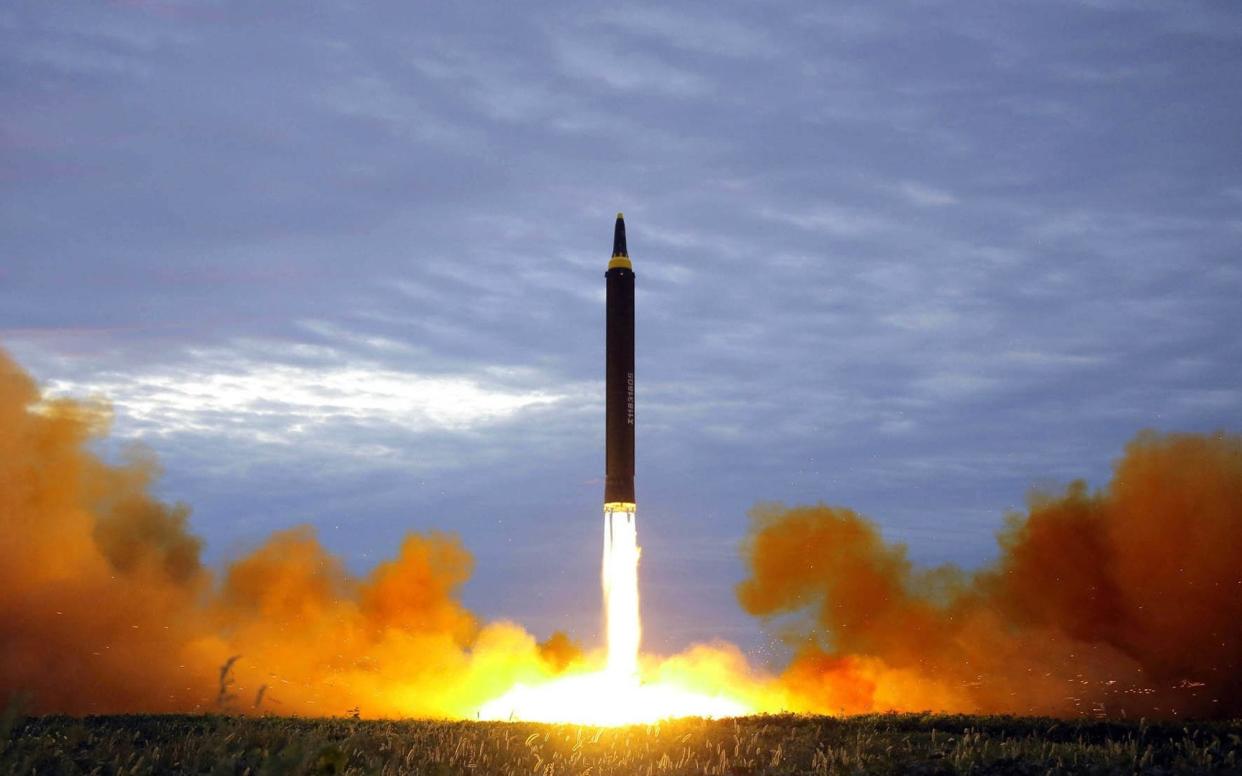International journalists depart for North Korea's nuclear test site, as experts warn demolition could destroy valuable evidence

International journalists on Wednesday set out on an arduous journey to witness the dismantlement of North Korea’s nuclear test site, Punggye-ri – an event that experts predict will be more about PR than substance.
The departure of about 22 Chinese, American, Russian and British journalists, including a Sky News team, from the North Korean port city of Wonsan, was delayed in order to wait for the arrival of eight more South Korean journalists from Beijing.
The South Koreans had initially been dropped from the trip after a diplomatic spat between North and South over military drills, but that decision was suddenly reversed early on Wednesday. It followed a threat from President Donald Trump that a June summit with Kim Jong-un could be called off.
Journalists on the trip revealed that they face a 12 hour train ride, followed by four hours on a bus and then a two hour hike to reach the remote test site in the mountains of Kilju County, North Hamgyong province.
Tom Cheshire, Sky News Asia correspondent, described a surreal first day after the first batch of journalists were flown to Wonsan on a charter flight from Beijing on Tuesday.

His team’s satellite phone and radiation dosimeter – a device to measure the level of nuclear radiation they would absorb – were immediately confiscated at the airport, he revealed.
“Officials assured us that the test site is completely safe so we would not need it, despite our repeated protests,” he wrote.
Even after arrival, the journalists were being kept in the dark about their schedule, he continued. “What is sure is that it will be what the North Korean regime want to show. A government minder is by our side every minute.”
Mr Cheshire said their hotel in the port city, which until recently was a base for artillery drills and missile launches, was intended to be a luxury resort and had the overpowering smell of fresh paint.
#breaking Bus carrying South Korean journalists arrives at our hotel in Wonsan. We depart for the Punggye Ri nuclear site in a few minutes. See you when we come out! pic.twitter.com/9FsO3JHeZv
— Will Ripley (@willripleyCNN) May 23, 2018
The visitors were offered a "bizarre banquet" in a large hall. “Music – a violin cover of Frank Sinatra’s My Way – was piped in. On the menu: everything from fondue to steak, as well as fried turtle and shark fin soup, and row after row of silver cutlery,” he said.
“In a country that has suffered so much from famine and poverty, and which continues to suffer, it was a dislocating experience.”
The journalists are expected to be able to film the dismantlement of Punggye-ri, the only active nuclear weapons test site in the world, from a viewing platform at a safe distance.
The exercise is intended by Pyongyang to show good faith over a moratorium on nuclear and missiles tests that it announced in April, amid a diplomatic thaw with South Korea and ahead of a summit with President Trump in Singapore that is still planned for June 12.
Since 2006, the North Korean regime has conducted six nuclear tests in tunnels beneath Mount Mantap, close to Punggye-ri. The most recent, on September 3 last year, caused a 6.3 magnitude earthquake.
According to several reports, the blast, which was almost 17 times the size of the bomb dropped on Hiroshima at the end of World War II, may have caused the site to partially collapse, raising concerns about the stability of the mountain itself.
In October, the Japanese media reported that a tunnel under construction had collapsed, killing up to 200 workers.
North Korea’s decision to close the site has been welcomed by the US and South Korea as a positive diplomatic gesture.
But scientists and nuclear experts, who have not been invited to the closing ceremony, have warned that the demolition of Punggye-ri’s tunnels will also destroy valuable evidence and data about the North’s weapons programmes.
North Korea's nuclear history: key moments
Cheryl Rofer, a chemist who has worked all over the world on the disassembling and decommissioning of nuclear and chemical weapons, said that much information about the country’s bombs could be gleaned by allowing experts access.
“I would want to bring some capability of taking samples, and I would also want to bring a geologist with me. I’d want to have a radiation counter, I would want to go into the tunnel to see if parts of it have caved in at the back,” she told CNN.
“Isotope measurements could tell you about the design of the device, it would tell you what kind of bombs they’re making, what they’re making them out of, how much uranium and plutonium is in the bombs. We might be able to infer what they’re planning and the shape of their progress,” she said.

